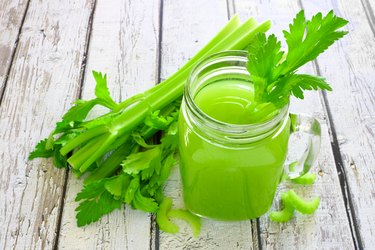
In recent years, there's been a proliferation of fad diets, such as the "detox diet," in order to achieve rapid weight loss. But it should be noted that detox diets and cleanses may not be the healthiest options when it comes to losing weight.
What Is a Detox?
Video of the Day
According to the NIH National Center for Complementary and Integrative Health (NIH), detox diets, also referred to as cleanses or flushes, are used to promote weight loss or removal of "toxins." The typical detox diet consists of a fasting period, followed by a diet of vegetables, fruit, fruit juices and water, says the Mayo Clinic. There are several "detox" methods listed by NIH:
Video of the Day
- Limiting your food variety.
- Using dietary supplements.
- Ingesting juices or other liquids for several days.
- Fasting.
- Cleansing the colon with enemas, laxatives or hydrotherapy.
- The National Health Service in the United Kingdom adds that cleansing can involve avoiding caffeine and alcohol as well as cutting out wheat and dairy foods.
In spite of the rising popularity of detox diets, there's little evidence of their efficacy. The reason for weight loss on a detox diet, says the NIH, is often because these diets are very low in calories.
Risks of a Stomach Detox
Not only is there scant evidence that detox diets work, but there's also information to suggest they may even be harmful. In fact, according to the NIH, the U.S. Food and Drug Administration and Federal Trade Commission have cracked down on companies selling detox and cleansing products because some contain harmful ingredients. Other risks include:
- Detox drinks that haven't been pasteurized or treated to kill bacteria, can make people sick, especially those with compromised immune systems, children and elderly people, explains the NIH.
- The weight loss that occurs from detoxing, explains the National Health Service, may make you feel, fatigued, dizzy and less energetic, as cleansing limits your energy and nutrient intake.
- The NIH also points out that fasting can cause headaches, fainting, weakness, dehydration and hunger pangs.
- Other risks, according to the NIH, include kidney problems and dehydration.
- Colon cleansing, often part of detox plans, may cause bloating, vomiting, nausea and cramping, says the Mayo Clinic.
Read more: One-Day Cleanse
How to Lose Belly Fat
The short answer to whether there are benefits to a detox diet is no. The Mayo Clinic explains that people report feeling more energetic after going on a detox diet. The reason for this may simply be due to cutting out processed foods and added sugar. Overall, detox diets are not a long-term solution, and if you are considering doing a cleanse or detox diet, you should consult your doctor beforehand.
Besides, there are plenty of healthy ways to get a flat stomach. The Centers for Disease Control and Prevention (CDC) recommends eating fewer calories than your body uses. This approach doesn't necessarily mean eating less food. Rather, it involves replacing foods with lower-calorie alternatives.
Johns Hopkins Medicine recommends physical activity to burn abdominal fat. The amount of exercise you need may depend on your weight loss goals. While you're at it, you can add strength training to your routine. This will help you to build lean muscle mass, which allows you to burn calories throughout the day.
- NIH: National Center for Complementary and Integrative Health: "Detoxes” and “Cleanses"
- Johns Hopkins Medicine: "8 Ways to Lose Belly Fat and Live a Healthier Life"
- Centers for Disease Control and Prevention: "Using Fruits and Vegetables to Manage Your Weight"
- National Health Service: "The Truth About Detox Diets"
- Mayo Clinic: "Nutrition and Healthy Eating"
Is this an emergency? If you are experiencing serious medical symptoms, please see the National Library of Medicine’s list of signs you need emergency medical attention or call 911.